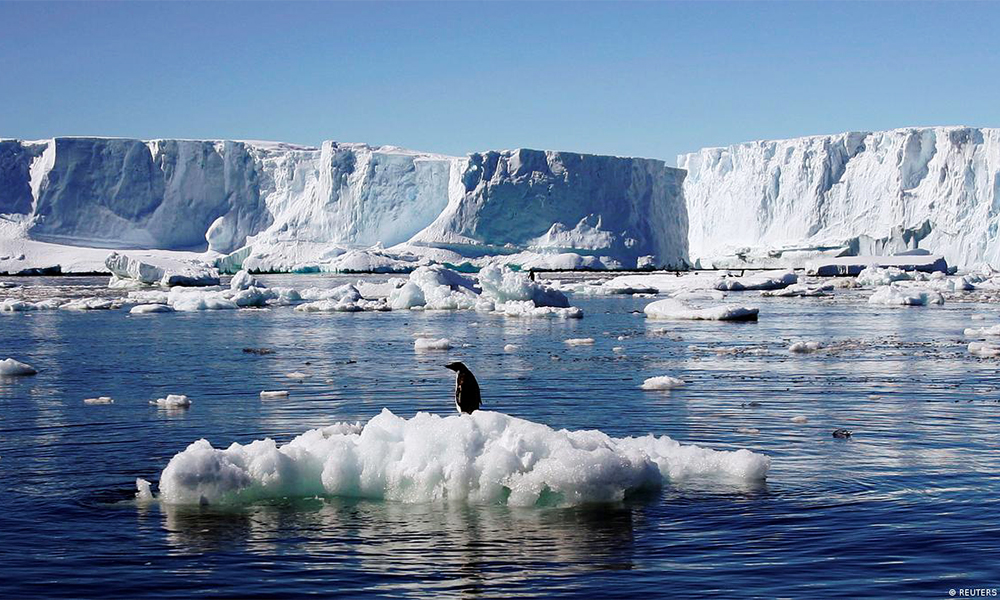Climate Change
Rising Antarctic ice melt will dramatically slow global ocean flows, study finds

Rapidly melting Antarctic ice is dramatically slowing down the flow of water through the world’s oceans, and could have a disastrous impact on global climate, the marine food chain and even the stability of ice shelves, new research has found, Reuters reported.
The “overturning circulation” of the oceans, driven by the movement of denser water towards the sea floor, helps deliver heat, carbon, oxygen and vital nutrients around the globe.
But deep ocean water flows from the Antarctic could decline by 40% by 2050, according to a study published on Wednesday in the journal Nature.
“That’s stunning to see that happen so quickly,” said Alan Mix, a paleoclimatologist at Oregon State University and co-author on the latest Intergovernmental Panel on Climate Change assessments, who was not involved in the study. “It appears to be kicking into gear right now. That’s headline news.”
As temperatures rise, freshwater from Antarctica’s melting ice enters the ocean, reducing the salinity and density of the surface water and diminishing that downward flow to the sea’s bottom, read the report.
While past research has looked at what could happen to similar overturning circulation in the North Atlantic – the mechanism behind the doomsday scenario that would see Europe suffer from an Arctic blast as heat transport falters – less has been done on Antarctic bottom water circulation.
Scientists relied on around 35 million computing hours over two years to crank through a variety of models and simulations up to the middle of this century, finding deepwater circulation in the Antarctic could weaken at twice the rate of decline in the North Atlantic.
“They are massive volumes of water… and they are bits of the ocean that have been stable for a long time,” said study co-author Matthew England, an oceanographer at the University of New South Wales, in a news briefing.
The effect of meltwater on global ocean circulation has not yet been included in the complex models used by the IPCC to describe future climate change scenarios, but it is going to be considerable, England said.
Ocean overturning allows nutrients to rise up from the bottom, with the Southern Ocean supporting about three-quarters of global phytoplankton production, the base of the food chain, said a second study co-author, Steve Rintoul.
“If we slow the sinking near Antarctica, we slow down the whole circulation and so we also reduce the amount of nutrients that get returned from the deep ocean back up to the surface,” said Rintoul, a fellow at Australia’s Commonwealth Scientific and Industrial Research Organisation (CSIRO).
The study’s findings also suggest the ocean would not be able to absorb as much carbon dioxide as its upper layers become more stratified, leaving more CO2 in the atmosphere, Reuters reported.
The study showed that warm water intrusions in the western Antarctican ice shelf would increase, but it did not look at how this might create a feedback effect and generate even more melting.
“It doesn’t include the disaster scenarios,” said Mix. “In that sense, it’s actually kind of conservative.”
Climate Change
Powerful earthquake of 6.2 magnitude shakes Istanbul

A strong earthquake with a magnitude of 6.2 shook Istanbul on Wednesday, Turkey’s AFAD disaster agency said, one of the strongest quakes to strike the city of 16 million in recent years.
There were no immediate reports of damage, but people evacuated buildings as the quake hit and shook the city, located on the European and Asian shores of the Bosphorus strait.
The epicentre of the quake, which struck at 12:49 (0949 GMT) was in the area of Silivri, some 80 km (50 miles) to the west of Istanbul. It was at a depth of 6.92 km (4.3 miles), AFAD said.
Broadcaster TGRT reported that one person had been injured as a result of jumping off a balcony during the quake, which occurred during a public holiday in Turkey.
AFAD warned people in the region against entering damaged buildings.
The German Research Centre for Geosciences (GFZ) said the earthquake had a magnitude 6.02. It was at a depth of 10 km (6.21 miles) GFZ said.
(Reuters)
Climate Change
Tornadoes, heavy rains rip across central, southern US
Millions of people are under alerts for tornadoes and flash floods and dangers will continue into early Thursday

Tornadoes ripped across a wide swath of central and southern United States on Wednesday, destroying homes and businesses and bringing down power lines and trees.
The National Weather Service said there had been at least 15 reports of tornadoes in at least four states by late Wednesday.
Eight people have been injured across Kentucky and Arkansas, including one critically injured in Kentucky’s Ballard County, local officials said.
Late Wednesday, Arkansas Governor Sarah Huckabee Sanders declared a state of emergency across the state due to the storms, which also brought hail and torrential rain, Reuters reported.
The NWS said millions of people were under alerts for tornadoes and flash floods and that dangers would continue into early Thursday.
Violent storms are forecast to ravage the country for several days, the NWS said, with Wednesday just “the beginning of a multi-day catastrophic and potentially historic heavy rainfall event.”
“The word for tonight is ‘chaotic’,” said Scott Kleebauer, a NWS meteorologist. “This is a large expanse of storms migrating slowly to the east, stretching from southeast Michigan down into southeastern Arkansas.”
The town of Nevada, Missouri, was hit by a tornado. Writing on social media, the state’s Emergency Management Agency said it caused “major damage to several businesses, power poles were snapped and several (empty) train cars were flipped onto their sides by the powerful storm!”
The NWS issued tornado and flash flood warnings for parts of Missouri, Arkansas, Tennessee, Mississippi, Indiana, Illinois, Kentucky and Oklahoma.
It called the rain threats for Arkansas, Missouri, Tennessee and Mississippi in the coming days a “generational flood event” with some locations forecast to see as much as 15 inches (38.1 cm) of rain by the weekend, which could cause rivers to burst their banks and cause “catastrophic river flooding.”
More than 400,000 customers had their power knocked out across the storm-hit area, according to PowerOutage.us.
Climate Change
UN urges aid to Myanmar quake survivors before monsoons hit, death toll climbs towards 3,000
Aid groups in Myanmar warned that the window to find survivors was closing fast.

United Nations officials who surveyed earthquake damage in Myanmar urged the global community on Tuesday to ramp up aid before the looming monsoon season worsens already catastrophic conditions, with the death toll at 2,719 and expected to surpass 3,000.
Drinking water, hygiene, food, shelter and medicine are the most critical needs following extensive damage to buildings, roads and bridges, said Marcoluigi Corsi, acting humanitarian and resident coordinator following a two-day visit.
“We remain, of course, deeply committed to reaching people in Myanmar who need aid,” U.N. spokesperson Stephane Dujarric said. “And we must act swiftly to provide relief before the upcoming monsoon season, which, of course, will even worsen this horrendous crisis.”
A civil war in Myanmar had displaced more than 3 million people long before the quake struck. U.N. Special Envoy for Myanmar Julie Bishop urged all sides to immediately cease fire, permit humanitarian access and ensure aid workers are safe.
“Continuing military operations in disaster-affected areas risks further loss of life,” she said in the statement.
Aid groups in Myanmar warned that the window to find survivors was closing fast.
Myanmar’s military ruler Min Aung Hlaing said the death toll from Friday’s 7.7 magnitude quake reached 2,719 as of Tuesday morning and was expected to surpass 3,000. Some 4,521 people were injured and 441 missing.
“Among the missing, most are assumed to be dead. There is a narrow chance for them to remain alive,” he said in a speech.
The quake, which struck at lunchtime on Friday, was the strongest to hit the Southeast Asian country in more than a century. It toppled ancient pagodas and modern buildings alike and inflicted significant damage on Myanmar’s second city Mandalay and Naypyitaw, the capital the previous junta purpose-built to be an impregnable fortress.
U.N. agencies said hospitals were overwhelmed and rescue efforts hindered by infrastructure damage and the civil war. Rebels have accused the military of conducting airstrikes even after the quake and on Tuesday a major rebel alliance declared a unilateral ceasefire to help relief efforts.
The earthquake was the latest in a succession of blows for the impoverished country of 53 million people following a 2021 coup that returned the military to power and devastated the economy after a decade of development and tentative democracy.
Myanmar’s military has been accused of widespread atrocities against civilians as it fought to quell a multi-pronged rebellion after the coup. It has dismissed the accusations as misinformation and says it is protecting the country from terrorists.
In neighbouring Thailand, the death toll from the quake rose to 21 on Tuesday, with hundreds of buildings damaged. Rescuers kept searching for life in the rubble of a collapsed skyscraper under construction in the capital Bangkok, but acknowledged time was against them.
The region has been hit by five more aftershocks.
Julia Rees of the U.N. children’s agency UNICEF said she witnessed entire communities in Myanmar that had been flattened, with immense destruction and psychological trauma.
“And yet, this crisis is still unfolding. The tremors are continuing. Search and rescue operations are ongoing. Bodies are still being pulled from the rubble,” she said in a statement.
“Let me be clear: the needs are massive, and they are rising by the hour. The window for life-saving response is closing.”
In the Mandalay area, 50 children and two teachers were killed when their preschool collapsed, the U.N. humanitarian agency said.
In a rare survival story, a 63-year-old woman who was trapped for 91 hours was pulled from the rubble of a building in Naypyitaw on Tuesday in a joint rescue effort by the Myanmar fire department and teams from India, China and Russia.
Myanmar’s civil war has complicated efforts to reach those injured and made homeless, including tight controls over the internet and communication networks.
The Three Brotherhood Alliance of three major rebel groups at war with the junta on Tuesday declared a unilateral one-month ceasefire, to allow urgent humanitarian efforts to “be carried out as swiftly and effectively as possible”.
In its nightly news bulletin on Tuesday, state-controlled MRTV quoted Min Aung Hlaing as saying the military had halted its offensives but unspecified ethnic minority armies were planning to exploit the disaster.
“The military is aware they are gathering, training, and preparing to attack,” it said, quoting the general as saying at an event to raise funds for quake victims. “We consider it as attacking us and will respond accordingly.”
One rebel group, the Karen National Union, on Sunday said the junta had conducted airstrikes in the east of the country at a time when it should be prioritising quake relief efforts.
Amnesty International said it had received testimony corroborating reports of air strikes near areas where quake recovery efforts were focused.
“You cannot ask for aid with one hand and bomb with the other,” said Amnesty’s Myanmar researcher Joe Freeman.
It was unclear if Min Aung Hlaing would make a rare foreign trip this week to attend a regional summit in Bangkok as planned. Thailand’s on Tuesday said the general may attend by teleconference.
In Bangkok, rescuers were still seeking signs of life in the ruins of an unfinished skyscraper that collapsed, aware that four days after the quake, chances had dimmed of finding survivors.
Fourteen deaths have been confirmed at the site and seven elsewhere in the city. The government is investigating the collapse and initial tests showed some steel samples from the site were substandard.
There were an estimated 70 bodies under the rubble and experts said 12 had been located using scanners, but access was blocked by large debris.
“Maybe they can survive one week or two weeks, so we have to go on,” Bangkok Governor Chadchart Sittipunt said. “The experts still have hope.”
-

 World5 days ago
World5 days agoThousands of protesters rally against Trump across US
-

 Latest News5 days ago
Latest News5 days agoPolio vaccination campaign launched in Afghanistan
-

 International Sports3 days ago
International Sports3 days agoIPL 2025: Robo-Dog ‘Champak’ explained
-

 International Sports5 days ago
International Sports5 days agoIPL 2025: 14-year-old Vaibhav Suryavanshi becomes youngest IPL player
-

 Latest News4 days ago
Latest News4 days agoAriana Afghan Airlines increases flights to China
-

 World4 days ago
World4 days agoPentagon chief Hegseth shared sensitive Yemen war plans in second Signal chat, source says
-

 Latest News4 days ago
Latest News4 days agoChina invites various Afghan delegations to attend Shanghai forums
-

 Latest News3 days ago
Latest News3 days agoAfghan-American appointed to lead US policy on Afghanistan
























